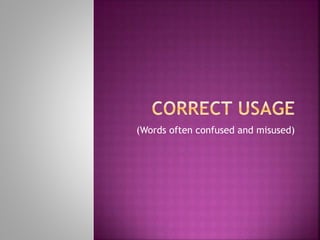
Words Often Confused and Misused
- 1. (Words often confused and misused)
- 2. Many words, for what ever reason, are often confused with another word and therefore misused. Sometimes the words look or sound somewhat alike, or they may have a somewhat similar meaning but have different accepted usages.
- 3. Accept – means to receive or to agree to something Example: “He did not accept the position” Except- means to exclude or leave out. Example: “Everyone except John is here”. 1. Everybody attended the review ( accept,except) Kyn because he 2. ( accepted, excepted)my proposal.
- 4. Advise- is a verb meaning an act of guidance Example: Advise her what she should do. Advice- is a noun meaning a recommendation that is given. Example: He gave me his advice. 3. My mother ( advise, advice ) me to see the doctor. 4. Thanks for the ( advise, advice).
- 5. Affect- is a verb meaning to influence. Example: His attitude will affect his chances. Effect- is a noun indicating a result or outcome. Example: What is the effect of smoking? 5. I was not ( affected, effected) by the rumors. 6. This is the ( affect, effect) of rumors.
- 6. Borrow – means that the person is taking or wishes to take. Example: May I borrow your car? Lend – means to give or to let use. Example: I am going to lend him my car. 7. Mikko wants to ( borrow, lend ) his book to me.
- 7. Can- means to be able or capable of doing something. Example: He can operate the machine. ( is able to ) May- means to seek or give permission. Example: He may operate the machine. ( giving permission) 8. (Can, May)I go out of the room?
- 8. Complement – refers to people or things that go well or work well together. Example: The vinegar complements with chicharong bulaklak. Compliment – means to praise. Example: They complimented us on the increased sales. 9. How I wish he will ( complement, compliment ) me for the things I’ve done for him.
- 9. Continual- refers to something that occurs regularly, but with interruption. Example: His continual complaints are irritating. Continuous – means something that occurs without a pause. Example: The rain continuously pours. 12. She ( continually, continuously ) escaped from her classes.
- 10. Emigrate - means to leave one’s country to settle to another. Example: To avoid political persecution, he emigrated from Russia. Immigrate – means to enter a new country to settle there. Example: Because of political persecution, he immigrated to the United States. 13. They (immigrate, emigrate) to Korea.
- 11. Fewer – is used for things that can be counted. Example: We have had fewer plant accidents this year. Less – is used for things or ideas that cannot be counted. Example: He is less qualified than she is. 14. Put ( fewer, less) sugar in your coffee.
- 12. Precede – means to come or go before someone or something. Example: The band will precede the float. Careful investigation should precede any action. Proceed – means to go on, usually after any interruption. Example: We can now proceed to the plan
- 13. Raise – means to lift or raise. It requires an object. Example: Those who agree, raise your hand. Rise – means to get up or go up. It requires no direct object. Example: Please rise when the President enters. 17. Don’t ( raise, rise) unless you are being called. Just 18. ( raise, rise ) a question later.
- 14. Aggravate – means to make worse ( a situation or condition) Example : His actions aggravated the situation. The rubbing aggravated the wound. Irritate – means to annoy or to make sore. Example: The loud noise irritated me. My skin is quite irritated. 19. The new shampoo you bought ( aggravates, irritates) my scalp.
- 15. Bad – is an adjective meaning disagreeable, offensive, defective. Example: Mother feels bad this morning. There is a bad odor inside the room. Badly – is an adverb meaning in a bad manner. Example :We are badly needed in the clinic. 20. He behaved ( bad, badly) in the meeting.